Member Spotlight: Ankita Singh
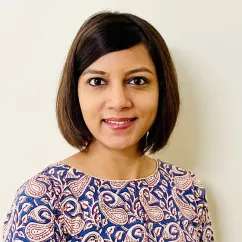
Ankita is a research and learning practitioner at UNCDF with a focus on building narratives driven by evidence and storytelling. Through context-led research, she unboxes opportunities to design solutions that work for low-income populations. Over the last 11 years, she has engaged extensively in exploratory and evaluative research on livelihood, financial health, natural resource management, and gendered social norms with women, adolescents and smallholder farmers.
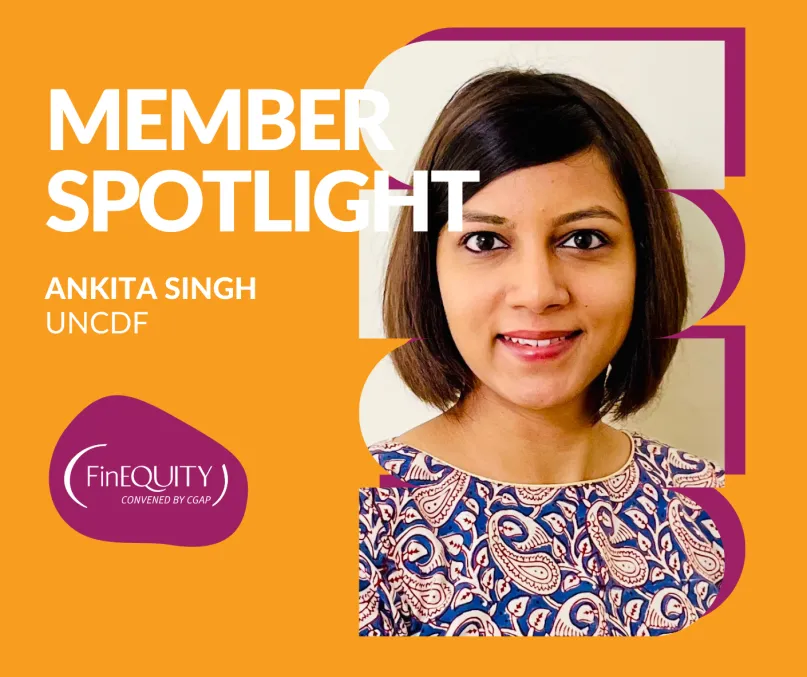
Ankita Singh, Research and Insights Specialist with UNCDF sat down with us to discuss designing for women, financial planning to support aging populations in EMDEs and much more.
FinEquity: Tell us a little bit about yourself. A fun fact? Something that might surprise most people? Your superpower?
Ankita: Hi! I am Ankita Singh and I work with the financial health program at UNCDF as a research and insights specialist. I have been working in the area of exploratory and evaluative research for over 11 years now. Some of the themes that I have gained experience over the years include financial health and inclusion, livelihoods, public health and education. The nuances of gender across these themes especially in low-income settings have always been intriguing for me and have helped me gain new perspectives.
A fun fact: I don’t know how fun it is for others, but I enjoy long-distance running, marathons especially. My superpower? I think it would be empathy. I love fieldwork a lot and I have been fortunate to travel for work in rural areas. Meeting people from backgrounds other than mine and learning about their ways of coping with challenges and finding solutions has helped me become more empathetic. Over the years, it has helped me reduce judgment and replace it with curiosity about people’s behaviors.
FinEquity: How did you get involved in the women’s financial inclusion space?
Ankita: I think my involvement in the space has been very organic. During my post-graduation, I had numerous opportunities for field travel in some of the poorest areas in Odisha [India]. It was during this time that I realized I really liked getting to know people’s contexts and how it shapes their mindsets and behaviors. Incidentally, I scored very low on market research but I did quite well in design research courses.
Over the next few years, I worked in action-oriented research with low-income households in public health, food security and adolescent education and saw the intricate connection all areas had with livelihood and income. Soon, I found myself surrounded by projects related to rural livelihoods and I also learned the complex ways of tabulating people’s incomes and expenditures, especially in agricultural settings.
It was during this phase that I also observed the generally undocumented contribution of women in household livelihood and decision-making. But, it was while testing a financial inclusion section of a survey tool that I started realizing the importance of formal financial systems, especially for women. I also couldn’t shake the feeling that the systems were not always designed for the low-income households whose needs were varied. Somehow the services offered treated all users as a homogenous group and did not take into account the immediate and external environment in which they operated.
Somehow the services offered treated all users as a homogenous group and did not take into account the immediate and external environment in which they operated.
Soon after, I had the opportunity to work with UNCDF on examining and understanding the determinants that contribute to people’s financial health and contribute to design through research and evidence.
FinEquity: You’ve been a research and insights specialist for UNCDF for over a year, can you tell us a bit about what that experience has been like so far? What are you working on that makes you excited?
Ankita: It has been an exciting year with new opportunities to collaborate with like-minded organizations and people, and to unlearn some of my beliefs. I've also had space to experiment with different concepts and tools within different financial health projects at UNCDF which has been the most amazing part of this journey. For instance, partnering with the CGAP team to use social norms as a tool to understand why and how women in low-resource settings work with money the way they do, has been very useful for our research work in Odisha.
I have also been able to examine the financial lives of the platform workers in the gig economy in Malaysia under the i3 program supported by Metlife Foundation. Understanding how fintechs can lead the way in improving the financial health of gig/platform workers has helped me realize the scope and power of digital financial services. For instance, observing how simple nudges at the right moment can help people inculcate a savings habit and its phenomenal results in their day-to-day financial lives has been quite rewarding.
Examining the aging issue in developing countries has been an engaging piece of work for me as well. When we think of the word aging, we think of the elderly (60+ age group). But, through our research in China, we learned that while designing better services for the elderly is essential, equal efforts need to be invested into the younger population groups for better financial planning for old age. Considering that by 2050 almost 80% of the elderly are expected to be living in developing countries, this is a topic that I am very keen to explore further.
Considering that by 2050 almost 80% of the elderly are expected to be living in developing countries, this is a topic that I am very keen to explore further.
Currently, our work with the Mission Shakti Department of Odisha, India where we are working with women collectives to bring them closer to the market, enhance their income-earning opportunities and increase their short-and-long-term savings is exciting. Designing services for different women segments in the state is going to be very challenging yet engaging. Interacting with the women collectives has also helped us find design inspiration for the program.
FinEquity: As a long-time researcher, what have been some of the most impactful findings you’ve come across in your career? What about in the last few years?
Ankita: Examining low-income women’s worlds through primary data always brings out some very thought-provoking insights that help in identifying new ways to build women-centric systems. For instance, through our work with platform gig workers in Malaysia, we noticed that only one out of three users of the different services were women. With some more digging, we found that the low engagement is driven by the design bias of the gig economy in Malaysia, which leans more towards men.

Discussions with various stakeholders revealed that jobs such as ride-hailing, food delivery and transportation are traditionally dominated by men while women are limited to onsite, home-based services. Due to the pandemic, onsite services had little to no demand. This not only highlights women’s limited access to a market that claims to provide flexibility but also how system designs often fail to fulfill women’s aspirations. Now, our team is gearing up to examine the social and financial lives of women in the gig economy in developing economies to find structural and behavioral gaps and opportunities to enhance their financial security and resilience.
Examining low-income women’s worlds through primary data always brings out some very thought-provoking insights that help identify new ways to build women-centric systems.
Over the years I have also observed the change in women’s aspirations as they transit across different life stages. The research in my early years with adolescents in India showed the difference in levels of confidence between teenage boys and girls in rural areas in completing their school education and getting a job. Girls below 10 years have similar dreams as boys but as they grow older, girls start voicing their concerns over the lack of agency to make such decisions and question their ability to get a job. The gendered social norms that often govern our society start very early for girls and chip away their confidence as they grow. Household financial worries are a key contributor to this behavior. It has led me to believe that to achieve consumer outcomes of financial security and resilience, our work must encompass a spectrum of sectors including livelihoods, health, education, and food security.
FinEquity: What are your top priorities in 2022 for your work?
Ankita: For our Odisha program interventions, we are focusing on designing women-centric outcomes and process indicators that help us measure and monitor progress with a focus on different segments of women. It will be interesting to see the emerging intersections of the WEE framework with the financial health outcomes in this process. We are also testing different combinations of pathways around income, savings, insurance, and pension that can strengthen resilience for women in rural and semi-urban households in Odisha. Examining the entry points for women in the platform economy and identifying solutions for both elderly and younger segments of an aging population in developing economies is something I'm also looking forward to working on.
FinEquity: Do you have a success story from your work with UNCDF or your consulting days that you’d like to share? (An occasion where you felt that you or your organization was making a real impact in the lives of women?)
Ankita: Through UNCDF’s work with the gig economy in Malaysia under the i3 program, we observed the power of savings as a pathway to build resilience among women consumers. Our focus on savings among women in the gig economy has improved our understanding of the segment and helped increase saving opportunities among women which are helping them tide over income volatility.
Further, in China, under the same program, UNCDF supported our partner in piloting an AI technology - natural language processing (NLP) - to reduce the cost of credit access, especially among women entrepreneurs. Understanding women face a shortage of time considering their household responsibilities and limited mobility, the product has helped small business women access affordable and instantaneous business credit through a mobile app.
FinEquity: What can our members connect with you about/what can they ask you about?
Ankita: Designing user-centric research on financial security, resilience, and control in developing country context; measurement of financial health outcomes; running joint pilots which are of common interest, and reaching out for setting research and design experiments in Odisha, India.
FinEquity: What role does FinEquity play in your work? Where do you see value in this community? How has being a member shaped your work?
Ankita: The community of practice at FinEquity creates an interactive space that brings together different stakeholders and allows for strong collaborations. For instance, the co-lab around Social Norms helped us learn different country contexts, methodologies and research tools with the help of different partners in the cohort. Moreover, this space facilitates learning from the experience of different industry experts and through resources on a wide variety of topics that add immense value to different ongoing work in the financial health and inclusion area.
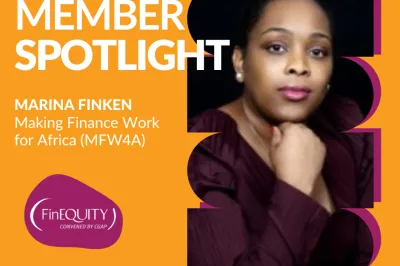
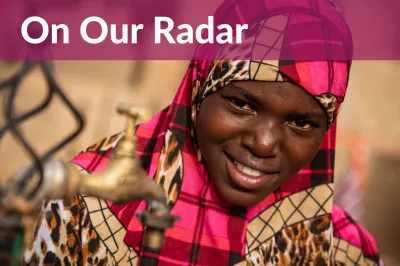
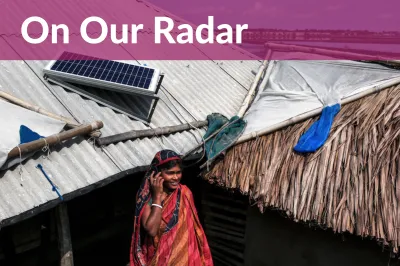
GREAT READ. THANKS ANKITA
Leave a comment